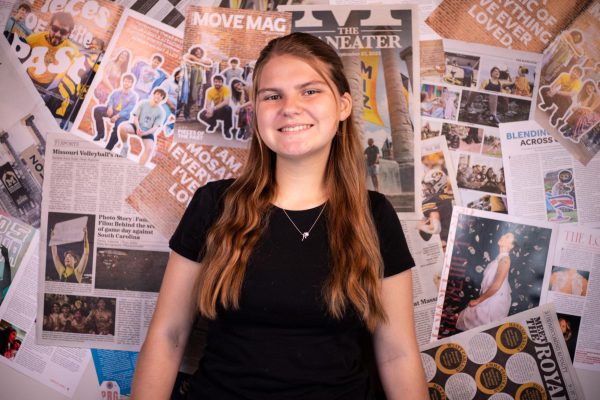Celebrated translator Emily Wilson gave a guest lecture titled “Translating the Violence of the ‘Iliad,’” on Friday, Sept. 19, in Cornell Hall.
Wilson is the department chair and a professor of classical studies at the University of Pennsylvania. In 2017, she released her translation of the “Odyssey,” making her the first woman to translate the text into English. In 2023, she published her translation of the “Iliad,” which was noted as one of the best books of the year by The New York Times, The Atlantic and more.
Wilson first came to the University of Missouri campus in 2019 after she released her translation of the “Odyssey.” This visit focused on the “Iliad,” and was hosted by the Mizzou Honors College. The lecture provided insight into her process of preserving the meaning of ancient texts when presenting them to modern, English-speaking audiences. The event was open to the public, and attendees included Mizzou students, faculty, alumni and UM System President Mun Choi.
Professors across campus have used her translations in their curriculum, including James Crozier, an associate teaching professor and the Director of Undergraduate Studies in the Department of Classics, Archaeology and Religion. Crozier said Wilson’s translations are his favorites.
“Artistically, it’s like a perfect capture of Homer,” Crozier said. “She really captures the poetic essence of what’s going on in the original, and that’s what’s so cool about her translations.”
One of the main differences between Wilson and other translators is her use of meter. As she explained during her lecture, most translations of Homer’s work are free verse. Wilson’s translations are in iambic pentameter, the same meter that William Shakespeare famously used in his plays. It mimics the original Greek meter used in the poems, which Crozier said helps them to feel authentic.
“It’s mind-boggling that she’s got it in meter– that’s the coolest thing. When you read it, it feels like reading the original, but you’re reading it in English,” Crozier said.
In addition, Wilson also discussed how slight word choice can ultimately change the piece’s original message. To illustrate her point, Wilson showed the translations of Richmond Lattimore and Robert Fagles for specific passages and compared them to hers. One specific example she used, comparing the way Hector talks to his wife Andromache among translations, stuck with Safiya Hasan, a first-year majoring in constitutional democracy.
“When she talked about how specific words varied from the Lattimore translation, the Fagles translation and her translation, like ‘strange woman’ versus ‘dear one’ versus ‘poor Andromache,’ I thought that was fascinating,” Hasan said.
Hasan is a student in “Epic Destinies, Individual Journeys,” the first of four courses in the Honors Humanities Sequence. Wilson visited with students in the Humanities Sequence and the Department of Classics, Archaeology and Religion. After her lecture, Wilson also answered questions. Being able to connect with engaged readers is one of her favorite parts of coming to college campuses.
“It’s a great privilege to meet so many excited young people,” Wilson said. “I like talking at bookstores and talking to general readers as well, but they usually haven’t paid nearly as much close attention to the text in the way that you do if you’ve read it and had discussions and seminars the day before.”
Edited by Erin Hynes | [email protected]
Copy edited by Anna Catlett and Ava Mohror | [email protected]
Edited by Chase Pray | [email protected]
















